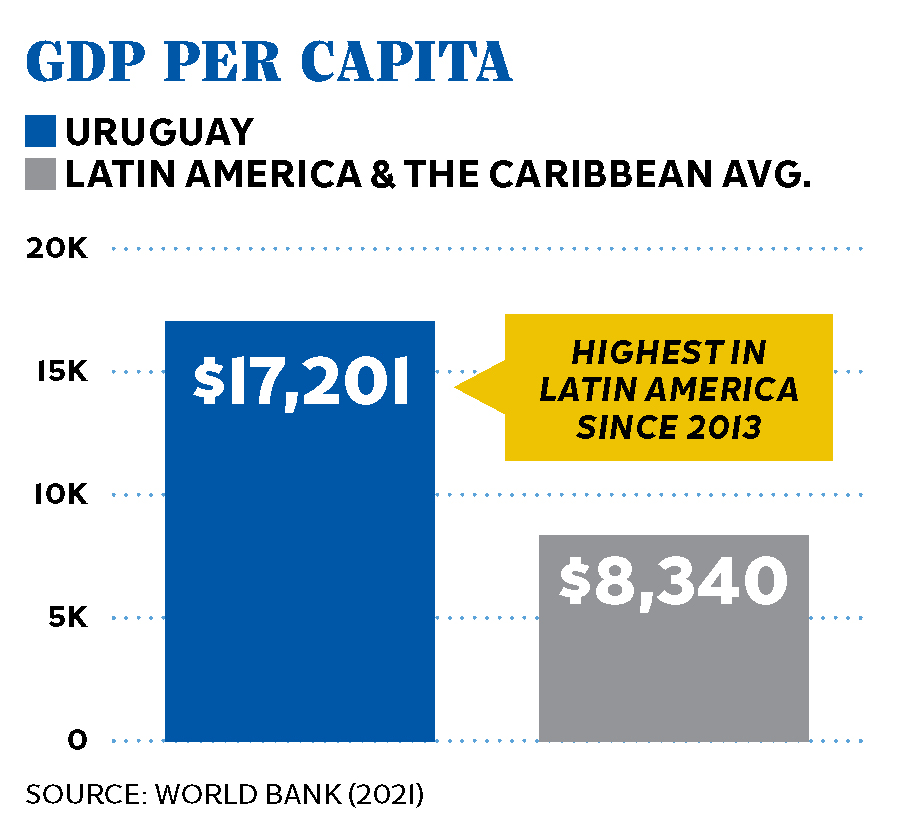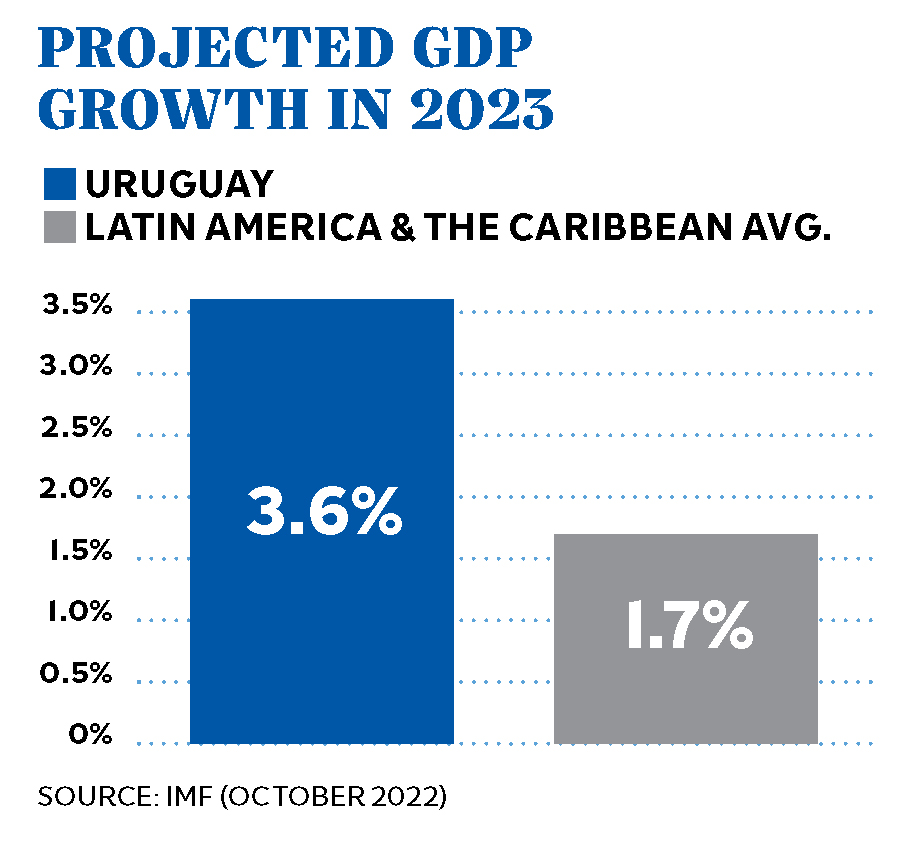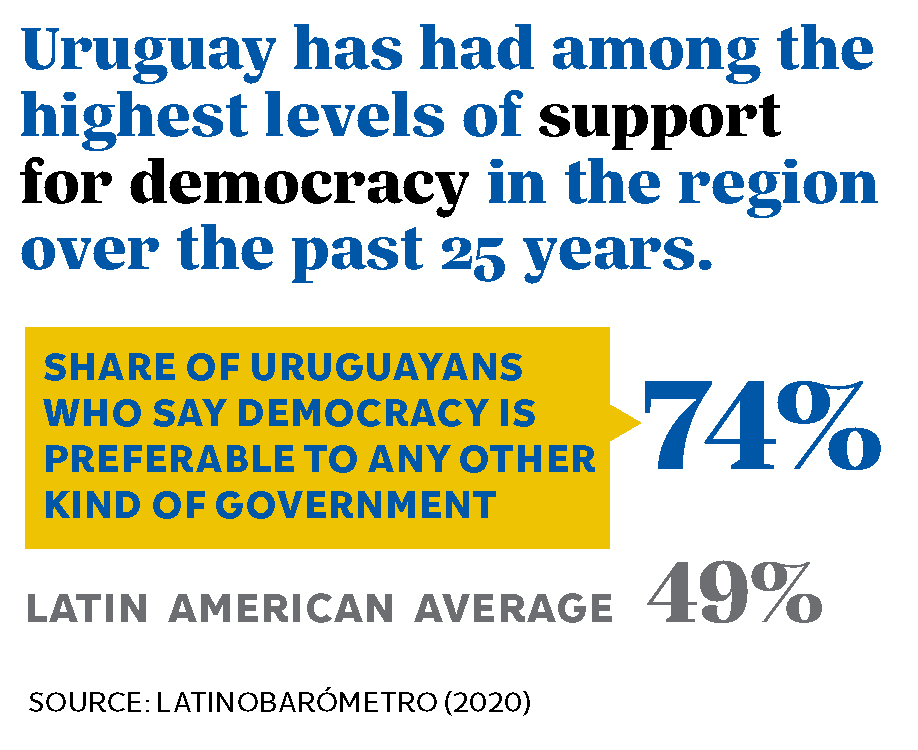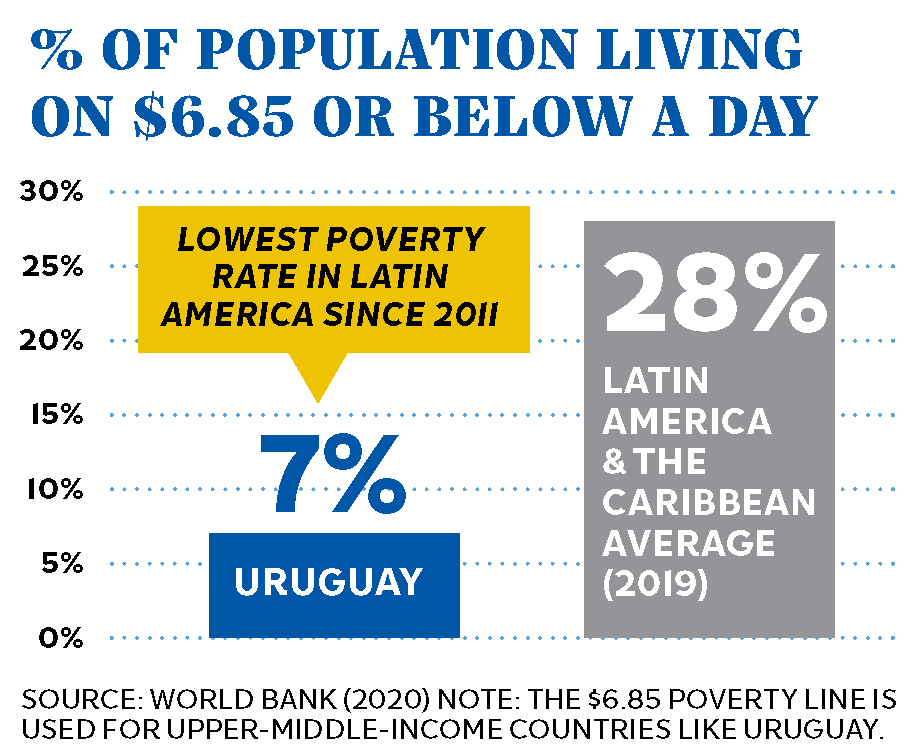Political analyst: What Uruguay can teach us PHOTO
Brian Winter, political analyst and the editor-in-chief of Americas Quarterly, has written an article saying that Uruguay - Latin America’s strongest democracy offers many lessons, including the value of a strong social safety net. Caliber.Az reprints the article.
It was a scene that inspired admiration, and no small amount of envy, all over Latin America.
At the January 1 inauguration of Brazil’s President Luiz Inácio Lula da Silva, not one but three presidents from Uruguay were in attendance: the current leader, Luis Lacalle Pou, as well as former presidents José “Pepe” Mujica (2010–15) and Julio María Sanguinetti (1985–90; 1995–2000), historic rivals in Uruguayan politics, one from the left, one from the center-right, smiling and clapping each other on the back as the cameras rolled.

In another era, such a scene might have been considered banal. But in this time of extreme polarization and social unrest throughout Latin America, the show of unity was treated as nothing less than a revelation on Twitter and elsewhere. “The Uruguayans are always so civilized, I don’t know how they put up with us as neighbors,” quipped Bruno Bimbi, an Argentine journalist. “That’s why Uruguay is Uruguay, and it’s the highest quality democracy in the region and one of the best in the world,” wrote Daniel Zovatto, a prominent political analyst based in Panama. Brazilian newspapers jealously noted the contrast with their own country; Lula’s predecessor Jair Bolsonaro skipped the inauguration after losing the election, and flew to Florida instead.
Frankly, it was not the first time Uruguay has seemed to be in a class of its own. The country has Latin America’s highest per capita income (about $17,000), its lowest poverty rate (7 per cent), and among its lowest levels of inequality. Uruguay’s energy matrix is the region’s greenest, and its economy is forecast to grow a healthy 3.6 per cent in 2023, more than double the Latin American average. International studies frequently portray Uruguay as the region’s least corrupt country; the Economist Intelligence Unit ranked it the 13th strongest democracy in the world, ahead of the United Kingdom (#18), Spain (#24) and the United States (#26), and well ahead of regional peers like Brazil (#47), Colombia (#59) or Mexico (#86).
This success has not gone unnoticed elsewhere throughout the region, and indeed the world. A conference last May at the Universidad Católica de Chile was entitled “The Uruguayan Case: A Possible Model?”, focusing on how it has combined economic growth with a strong social safety net. Uruguay is attracting record numbers of expatriates not just from Argentina, as it often does during times of crisis there, but also from Brazil, Chile, Venezuela and beyond. The resort city of Punta del Este became a magnet for remote workers during the pandemic, fueling a real estate boom estimated at $6 billion in new investments in just the past three years; a private school there has students from 34 different countries. The idea that Uruguay is becoming a kind of Singapore for South America, a relative oasis for business and trade on a troubled continent, has drawn attention from global companies and great powers alike; Lacalle Pou’s conservative government recently opened negotiations for trade deals with China and Turkey. Tim Kaine, a Democrat on the Foreign Relations Committee of the United States Senate, recently called Uruguay “a model in so many ways” and asked why the U.S. is not investing more, or pursuing its own trade agenda there.
Given all of this interest, I traveled to Montevideo in November hoping to answer the questions: What can we learn from Uruguay? What are the secrets to its relative success? Over the course of a week, I interviewed leading politicians, analysts, business leaders and everyday people in an effort to understand Uruguay’s strengths and weaknesses, and how other countries in the Americas, including the United States, might learn from them. I attended a political rally; I walked the capital’s riverside rambla; I ate a chivito, the unofficial national dish consisting of a steak topped with ham, bacon, cheese and a fried egg. OK, I ate two of them.
Despite such delights, one of the more obvious conclusions of my visit was this: Uruguay is definitely not a paradise. It is a country that arguably had its best moment more than a century ago, when farm exports briefly made it, with Argentina, one of the world’s 10 richest countries. In intervening years, there have been long periods when the economy barely grew at all, and today economists say it performs well below its potential, with an average annual growth rate of just 1 per cent in the five years prior to the pandemic. Montevideo can seem like a grayer, less dynamic version of Buenos Aires; even in well-off neighborhoods, almost everything could use a fresh coat of paint. Today’s Uruguay is struggling with a genuinely frightening crime wave, including a homicide rate almost double that of Argentina or Chile, driven in part by expansion of criminal gangs from elsewhere in the region. Only about 40 per cent of students finish high school, one of the lowest rates in Latin America, although test scores are high by regional standards. In late 2022, a corruption scandal erupted involving Lacalle Pou’s administration, challenging the country’s carefully cultivated reputation for clean government.
Similarly, it is reasonable to ask to what extent Uruguay’s success really is replicable elsewhere in Latin America. Many Brazilians and Argentines roll their eyes, contending that Uruguay’s small population of about 3.4 million people makes it much easier to govern. (This ignores the fact that, say, Honduras and El Salvador are also small.) Others say Uruguay’s history of European immigration has made it a “homogenous” and therefore prosperous place. (This is demonstrably false, and also racist, but I’ve heard it a lot.) Still others whisper Uruguay may have some merits, but has benefited above all from the mistakes of Argentina and Brazil, consistent with its history as a buffer state subject to the cycles of its much larger neighbors.
But it’s also true that Uruguay’s story is more … well, relatable … than many people assume. Today’s thriving democracy was a dictatorship as recently as 1985, plagued by the same divisions and human rights abuses seen elsewhere on the continent. That enviable 7 per cent poverty rate? Just 20 years ago, it reached 40 per cent, amid an economic crisis so severe that Uruguay was exporting skilled workers by the thousands, not receiving them. Even the political bonhomie on display at Lula’s inauguration took work to build, and is al- ways in danger of fading, said Sanguinetti, one of the two former presidents who inspired such admiration.
“Oh, if people think Uruguay was always like this, they’re wrong,” Sanguinetti, age 87, told me with a laugh. “Nothing is easy. I’m sure there are lessons we can humbly offer others.”
There are indeed many. But based on my travels and research, I would highlight four takeaways that help explain Uruguay’s imperfect success story:
1. A social safety net strengthens democracy—and capitalism too
Mujica, the other former president who traveled to Lula’s inauguration, earned a global following in the 2010s as a kind of oracle of anti-consumerism, continuing to drive his 1987 Volkswagen Beetle to and from his humble farm outside Montevideo every day while in office, instead of living in the presidential palace, and also donating 90 per cent of his salary to charity. And while Mujica was never as universally popular at home as he was abroad, one of his most famous sayings does indubitably capture the Uruguayan ethos: Nadie es más que nadie, or, roughly translated, “No one is better than anyone else.”
That egalitarian philosophy stands out in Latin America, where the world’s biggest gap between rich and poor has fueled countless social conflicts over the years. And while it remains more an ideal than a reality, it has underpinned what by some measures is the region’s oldest and most generous welfare state. Today, around 90 per cent of Uruguay’s population over 65 is covered by the pension system, among the highest rates in the region. The state provides unemployment insurance, cash transfers to low-income families, resources for care of children and the elderly, and a public health care system.
Paying for all this isn’t cheap, of course. Uruguay collects about 27 per cent of its GDP in taxes, above the Latin American average (22 per cent), although less than Brazil (32 per cent) and Argentina (29 per cent) and well below the average of the OECD (34 per cent), a club of mostly developed European countries. Overall, the government plays a large role in Uruguay’s economy: state-run companies dominate the oil sector, mortgage lending and even Internet data transmission. About one in five workers is employed by the public sector, according to the World Bank.


Javier de Haedo, an economist with ties to Uruguay’s center-right, said the economy has been weighed down by a long-term cycle of rising social demands, tax increases and periodic restructurings of the debt. “That’s the history of Uruguay,” he told me. “The only solution is to grow more.” Lacalle Pou, the current president, arrived in office with an agenda of business-friendly reforms following 15 consecutive years of rule by the leftist Frente Amplio, or Broad Front. But in a stroke of fate, Lacalle Pou was inaugurated on March 1, 2020, 12 days before the first COVID-19 case appeared in Uruguay. He has spent much of his term managing the pandemic instead of passing legislation.
But even Lacalle Pou and his allies are focused more on adjustments to the existing system—raising the minimum age for pensions, for example— than tearing it down entirely. In Uruguay, you hear very little of the heated rhetoric about socialism or neoliberalism that dominates politics elsewhere in Latin America. “It almost doesn’t matter who’s in power; there’s a kind of social democratic consensus that doesn’t fundamentally change,” said Nicolás Saldías, a Uruguayan-born analyst for Latin America at the Economist Intelligence Unit. “What you hear are debates over tax rates, more than the tax itself.” De Haedo, the critical economist, recognized there have been “spectacular examples” of good administration by the public sector.
The Uruguayan model may not be for everybody. But in an era when demands for greater social rights and services have swept Latin America, leading to violent protests and severe instability in countries like Chile, Ecuador, Peru and elsewhere, it is hard not to notice that Uruguay is … pretty quiet. Even in the aftermath of the pandemic, Uruguayans generally felt their basic needs were being met. In a poll published in May 2022 by the United Nations, 37 per cent of Uruguayans said their socioeconomic situation was good, 48 per cent called it neither good nor bad, and only 14 per cent called it bad. Given the relative satisfaction with the status quo, it seems no accident that Uruguay has never elected a true populist on the ideological left or right, while the fundamental pillars of a stable, market-based economy are also widely accepted.
I spoke to a group of young activists from Lacalle Pou’s right-of-center National Party, and they, too, seemed to appreciate the balance. “People in Uruguay feel protected,” said María Ángela Rosario, 27. “I don’t know anyone who wants to fundamentally change that.”
2. Slow and steady wins the race
To do something a la uruguaya means to do it slowly, gradually, deliberately. It is a celebrated aspect of local culture—as Uruguayan as drinking mate tea, or watching the sun set over the River Plate (both of which, not coincidentally, should be done a la uruguaya.)
And, like so many other things here, it can be a double-edged sword.
When new legislation is proposed, politicians say it is usually debated, and debated—and then debated some more. Reforms often aren’t considered final until they are approved by popular plebiscites or referendums, which can take years to organize, and have been used since the 1990s to vote on privatization of public services, amnesty laws, anti-crime policies, water rights and more. By the time the change takes effect, sometimes the world has moved on. “I have seen Uruguay miss out on so many opportunities because we couldn’t act on time,” a lawyer who works with international investors told me, citing deep-water ports, data centers and more.
Indeed, even in Montevideo, the pace of everything—commerce, politics and daily life—can come as a bit of an adjustment to those more accustomed to Buenos Aires, Lima or Mexico City. One morning, I committed a journalist’s cardinal sin: I ran out of space in my notebook. It was 11:30 am on a Wednesday, and I was in the heart of downtown. I found a paper store two blocks away; the keys were in the front door, which I slowly opened, and stood waiting for a few minutes until an older man, mate in hand, appeared in the back of the store. “¡Buen día!” he said cheerily. “We don’t open until, I don’t know, 12:45 or 1. Try across the street.” So I did: “Ah, I’m out of notebooks,” the salesman there said. “Come back Monday or Tuesday. Or you could try across the street.” I finally gave up, and borrowed one from a Uruguayan journalist. Other expats shared similar stories of a country that rarely seems to be in a hurry. A friend from São Paulo told me: “Every day, I want to scream.”


But taking a deliberate approach to life has its advantages, especially in politics. A reform may take a long time to pass and then survive a referendum. But once it does, the change is considered legitimate and settled, and people generally move on. “We have a political culture of making decisions, and accepting them,” Yamandú Orsi, the mayor of Canelones, a city north of Montevideo, and a possible presidential candidate in the 2024 election, told me. “What may look slow from the outside is often a democratic search for dialogue and consensus.”
As a result, Uruguay has little of the scorched earth politics seen elsewhere in Latin America, as well as in the United States and Europe, in which governments enter office determined to undo the achievements of their predecessors. This stability has given certainty to investors—a sense of long-term direction usually lacking in the rest of the region. “Boring is good. God, I wish Argentina and Brazil were this boring,” one investor told me. As with so much else in Uruguay, I was left wondering if it was possible to separate the positive from the negative.
3. Institutions matter, especially when they’re accessible to the public
While I was in the country, a major scandal was unfolding over a scheme in which government officials allegedly sold dozens, and perhaps hundreds, of fake passports to foreigners, including Russians fleeing their country after the invasion of Ukraine. As prosecutors dug into the case, they also found signs that Lacalle Pou’s presidential bodyguard tried to sell software that could be used to track opposition leaders. (The president, his bodyguard and other officials denied wrongdoing.)
Through it all, prosecutors did their work normally, without political interference, as is the Uruguayan way. “The strong sense of a republic makes it so the average Uruguayan understands that none of the branches of government can step on the other. Above all, the judicial system is a safeguard,” said Agustín Mayer, a lawyer for the Ferrere law firm. And while the scandal was clearly embarrassing and a blow to the country’s reputation, some saw an opportunity to further strengthen Uruguay’s democracy. “What I see is society debating this, processing it, trying to understand what happened,” said Adolfo Garcé, a political analyst. “That is what we do. This is a democracy with a tremendous ability to learn.”
One thing that sets Uruguay’s institutions apart is how open they are, and integrated into society. Almost everyone seems to be part of something; a political party, a union, a neighborhood club, that in turn has ties, or at least some connectivity, to the state. “Active social movements have been the motor of Uruguayan politics and democracy,” Carolina Cosse, the mayor of Montevideo and another possible presidential hopeful, told me. She said virtually “all” social policy reforms of recent years began at the grassroots level, pointing to universal health care, marriage equality and a new university in the country’s interior as causes that politicians then adopted as their own. Cosse and others highlighted the particular importance of political parties: The same three have dominated Uruguayan politics for decades, have espoused generally consistent ideologies instead of serving as personalistic vehicles, and count thousands of everyday people among their members.
All this mixing of regular people and elected officials also demystifies politics a bit—and here, OK, the country’s size may indeed play a role. Four different people showed me selfies with President Lacalle Pou, taken at ice cream shops and restaurants and on the street. This may also contribute to Uruguay’s culture of transparency. “If a politician buys an expensive new car, everybody knows it. We live next to each other, we see each other at the grocery store,” said Martín Aguirre, editor of the newspaper El País. As if to prove his point, as we left our lunch (chivito, naturally), we bumped into his aunt. They chatted for 15 minutes; as we left, he smiled and shrugged. “Small country!”
4. Civility is difficult, but worth it
It would be tempting to conclude that the emphasis on civility in Uruguayan politics is also a byproduct of people living side by side. But it was not always so—especially in the 1960s and 1970s, when Uruguay fell into the same spiral of guerrilla violence and brutal repression that plagued much of the region. In our conversation, Sanguinetti told me he and Mujica used to be “not just adversaries, but enemies,” noting that Mujica was a leader of the Tupamaro rebel group that didn’t fully rejoin mainstream political life until democracy returned in the 1980s.
Healing those divisions took time and effort. Mujica, who spent 13 years in jail, has spoken movingly over the years about his own journey. “I have my long list of defects, I’m a passionate person, but for decades now in my garden I don’t cultivate hatred,” Mujica said upon retiring from day-to-day politics in 2020. “I learned a tough lesson that life imposed on me, which is that hatred makes one stupid, because it makes us lose objectivity when faced with things.”
Such sentiments seem to have trickled down into society as a whole. Orsi spoke of the importance of “unwritten rules” in Uruguayan politics, namely respect for the opposition by whichever government is in power, noting that Lacalle Pou attended his inauguration as mayor even though they’re from rival parties. “That’s something I’ll never forget,” Orsi said. He is 55, and the president is 49, suggesting these traditions are indeed being handed down to a new generation of leaders. Nonetheless, other Uruguayans I spoke to voiced a sense that these traditions are under stress—because of social media, and the pressures sweeping the rest of Latin America in the wake of the pandemic. Some noted with concern the fourth-place finish in the 2019 election of a party with populist leanings. Chile is an example of how even the region’s most vaunted success stories can fall apart quickly, with little warning.
And that’s why Sanguinetti and Mujica, even at the age of 87, continue to make a showcase of their relationship, even writing a recent book together. “We still disagree about many things, fundamental things,” Sanguinetti said. “But well, these old guys are trying to show the new generations that you can disagree, without losing civility.”
“I think others can do this too,” he added. “There’s nothing special about Uruguay.”








